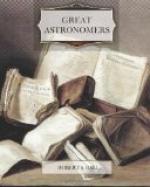Brinkley had another profession in addition to that of an astronomer. He was a divine. When a man endeavours to pursue two distinct occupations concurrently, it will be equally easy to explain why his career should be successful, or why it should be the reverse. If he succeeds, he will, of course, exemplify the wisdom of having two strings to his bow. Should he fail, it is, of course, because he has attempted to sit on two stools at once. In Brinkley’s case, his two professions must be likened to the two strings rather than to the two stools. It is true that his practical experience of his clerical life was very slender. He had made no attempt to combine the routine of a parish with his labours in the observatory. Nor do we associate a special eminence in any department of religious work with his name. If, however, we are to measure Brinkley’s merits as a divine by the ecclesiastical preferment which he received, his services to theology must have rivalled his services to astronomy. Having been raised step by step in the Church, he was at last appointed to the See of Cloyne, in 1826, as the successor of Bishop Berkeley.
Now, though it was permissible for the Archdeacon to be also the Andrews Professor, yet when the Archdeacon became a Bishop, it was understood that he should transfer his residence from the observatory to the palace. The chair of Astronomy accordingly became vacant. Brinkley’s subsequent career seems to have been devoted entirely to ecclesiastical matters, and for the last ten years of his life he did not contribute a paper to any scientific society. Arago, after a characteristic lament that Brinkley should have forsaken the pursuit of science for the temporal and spiritual attractions of a bishopric, pays a tribute to the conscientiousness of the quondam astronomer, who would not even allow a telescope to be brought into the palace lest his mind should be distracted from his sacred duties.
The good bishop died on the 13th September, 1835. He was buried in the chapel of Trinity College, and a fine monument to his memory is a familiar object at the foot of the noble old staircase of the library. The best memorial of Brinkley is his admirable book on the “Elements of Plane Astronomy.” It passed through many editions in his lifetime, and even at the present day the same work, revised first by Dr. Luby, and more recently by the Rev. Dr. Stubbs and Dr. Brunnow, has a large and well-merited circulation.
JOHN HERSCHEL.
This illustrious son of an illustrious father was born at Slough, near Windsor, on the 7th March, 1792. He was the only child of Sir William Herschel, who had married somewhat late in life, as we have already mentioned.
[Plate: ASTRONOMETER made by sir J. Herschel to compare the light of certain stars by the intervention of the moon.]




